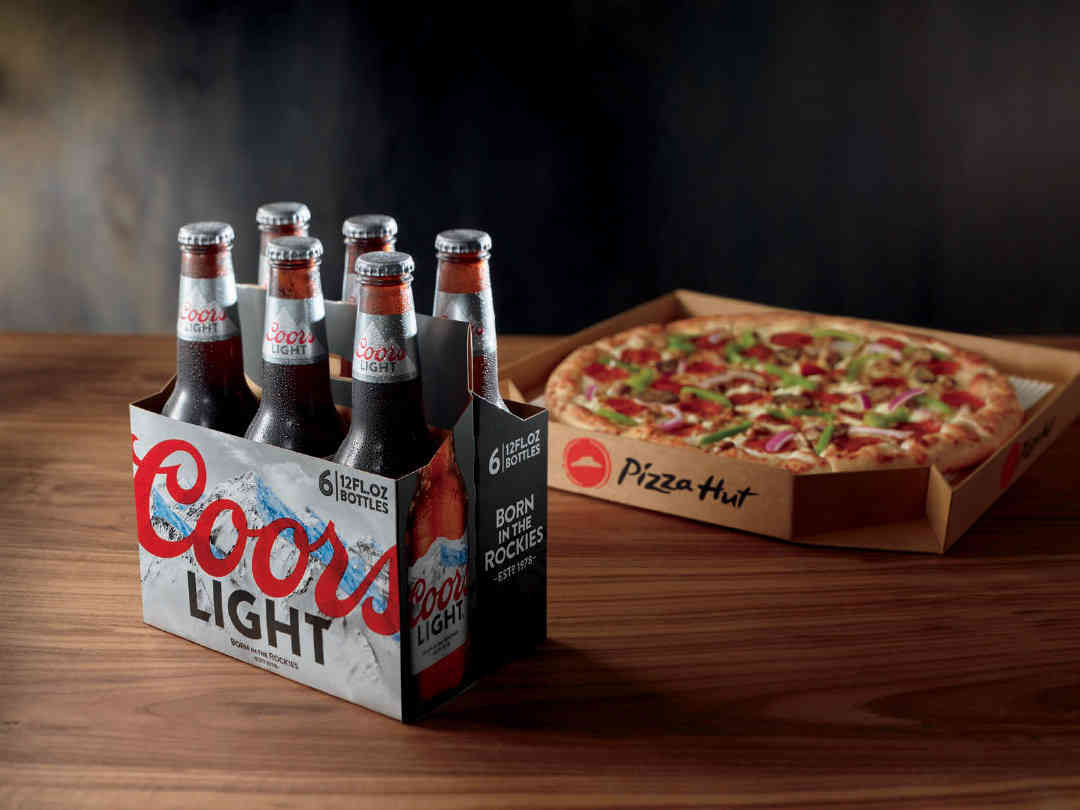Pizza Hut has been delivering hot pizza to its customers across the country for 33 years. It knows delivery. The chain, with some 6,100 stores across the country, sells beer in many locations. So it also knows beer.
And in late 2017, the light went on: Why not offer pizza delivery customers the choice of ordering cold beer alongside their hot pizza?
Pizza Hut, armed with advertising support from MillerCoors, started with a small test in select markets in Arizona. “And once we saw the excitement among franchisees, our team members, and our customers for hot pizza and ice-cold beer, we saw a natural connection,” says Wanda Williams, Pizza Hut’s vice president of operations.
The results speak for themselves, she says. “When we look at the amount of new customers and incremental sales from beer delivery sales, we can say all have grown at a significant rate. It’s a huge initiative for us.”
By the end of this year, the chain expects to be on the brink of expanding its beer delivery services to some 1,000 locations across multiple states, triple the number from the start of 2019, Williams says.
“This is an important alliance for us,” says Casie Kitzmiller, vice president of national accounts for MillerCoors, which has two of the top three sellers across the Pizza Hut delivery program in Coors Light and Blue Moon. “For both Pizza Hut and MillerCoors, this is unleashing growth, a game-changer – a big deal."
The chain also sells beer brands from other brewers, including Anheuser-Busch and Constellation Brands.
For Pizza Hut, adding beer as a delivery option is boosting guest checks and recruiting new customers. MillerCoors, meanwhile, is getting its brands in front of a bigger audience and, naturally, selling more beer in a channel that didn’t exist two years ago.
The initiative also comes as fewer diners are choosing to eat inside restaurants, opting instead for takeout and delivery, a trend fueled by the rise of third-party apps such as GrubHub, Postmates and UberEats, among others. But aside from Pizza Hut, very few offer customers the ability to also purchase cold beer at the same time, leaving brewers like MillerCoors with the potential for lost sales.
“This is definitely an emerging space for us, especially as more consumers migrate toward the ease of delivery.” Kitzmiller says. Thus the collaboration with Pizza Hut, which put forth an aggressive plan to expand after resounding success in its test markets.
MillerCoors and Pizza Hut worked together developing a strategy, with MillerCoors helping the pizza chain “understand the beer category, beer drinkers, what beers pair best with which menu items and how our consumer intersected with their consumers,” Williams says.
Rolling out beer delivery at a nationwide chain is a tricky proposition because state, county and city laws that govern alcohol vary widely across the country. On top of that, some states and municipalities require special licenses and impose certain restrictions.
For now, 22 states allow beer delivery, but others are coming on board each year, Williams says. Texas, Louisiana and Colorado, for instance, are in the process of changing or clarifying their laws to allow the service, opening three new markets for Pizza Hut to sell beer via delivery.
When Pizza Hut expands the service to 1,000 stores by January or so, it will be one of the largest beer distribution points across the U.S. that serves beer with food, Williams says. “And unlike (third-party app-based delivery services), our customers don’t have to leave the house to go to the grocery store to get cold beer to go with their hot pizza or wings. They can just stay home and truly experience occasions like watching football or playing video games.”
And it’s not just beer paired with pizza or wings. In some states, customers are allowed to order beer only, which has been “a huge incremental push of new customers into our business,” she says.
There’s plenty of opportunity for expansion ahead, Williams says. Consumer awareness of beer delivery is still low, new licenses are getting approved each week and additional markets are expected to legalize the practice. “There’s so much more room to grow,” Williams says.

